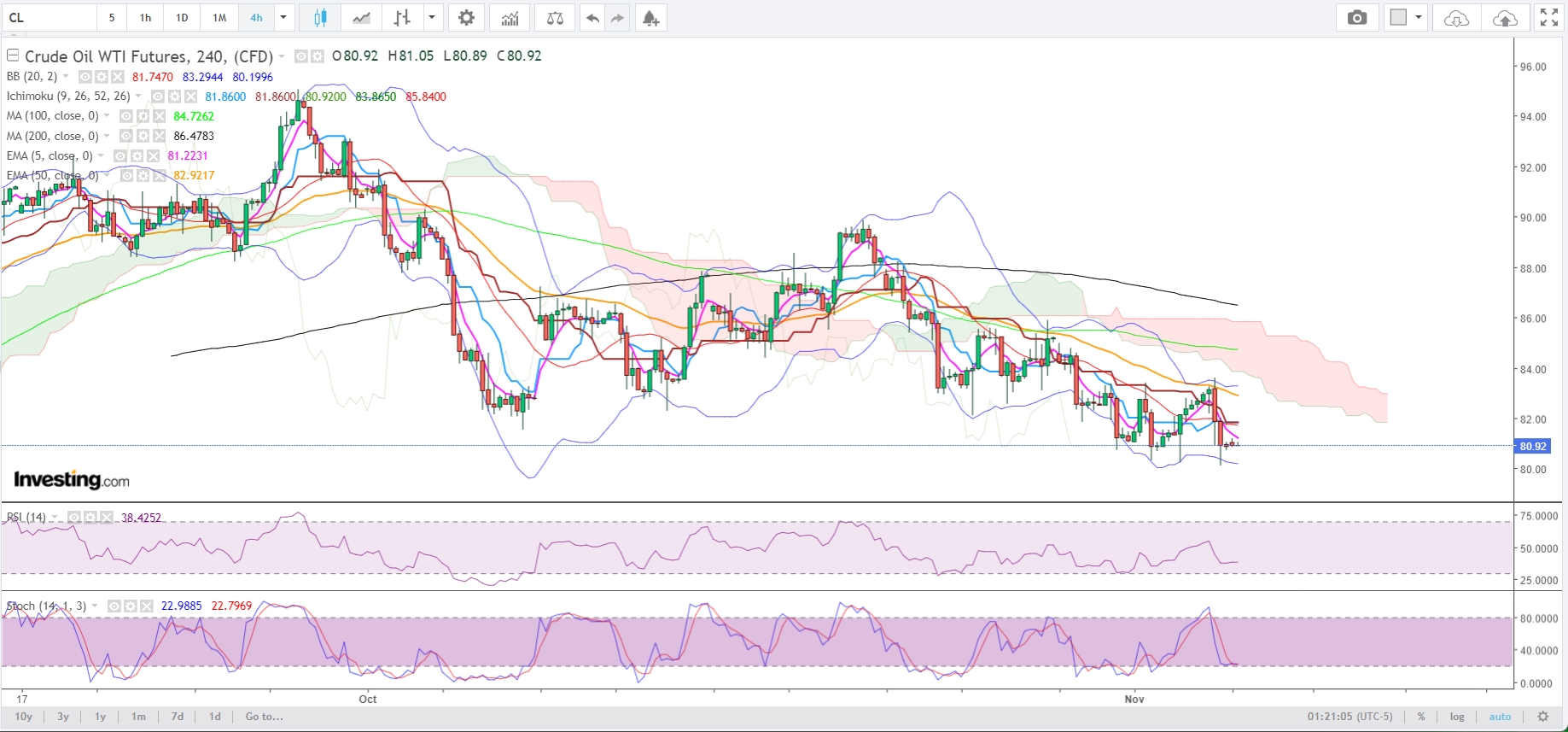Commodities Week Ahead: Bulls to Bolster Defense for $80 Oil
2023.11.06 03:38
- WTI’s hold of $80 could be tested if Chinese data emerges weaker than thought
- Those long crude seemed encouraged by the Saudi-Russian bid to keep up with production cuts till the year end
- But a continuous thinning of the Middle East war premium for oil, questions over Chinese demand makes $80 oil vulnerable
It’s coming down to the wire: ’s defense of $80 per barrel, with bulls in the game determined not to slip up, especially with impending economic data from top importer China likely to swing the market either way after last month’s disastrous loss.
Crude prices bobbed in the positive as a new trading week began in Asia, with markets being generally less tense about the of a Federal Reserve rate hike after the central bank did not make a clear stand on whether an increase was still likely in December before the year-end.
But gains were minimal, with recent pressure to the downside still evident after last week’s 6% drop that extended October’s near 11% slump.
While those long crude seemed encouraged by the Saudi-Russian stance to keep up with production cuts till the year-end, there was also considerable uncertainty over several economic readings this week due from China.
Thus, the odds of US crude breaking beneath the $80 per barrel mark were very much alive, especially with a minimal — or even zero, depending on how one looks at it — war premium being assigned to oil from the Israel-Hamas conflict which has not led to any supply disruption.
Some reports on the war could be seen as positive for crude, with Israel continuing to reject calls for a ceasefire, and Russian mercenary group Wagner planning to provide Hezbollah with air defense systems.
A Break Below $80 Could Send WTI to $78 Levels, Charts Show

Chart by SKCharting.com, with data powered by Investing.com
Sunil Kumar Dixit, chief technical strategist at SKCharting.com, said, referring to US crude’s West Texas Intermediate, or WTI, benchmark:
“Failure to make a sustainable break above $81.90 will resume the bearish pressure that drags WTI towards retesting the $80 mark.”
“Below this level sits the major support, seen at the 200-day SMA, or Simple Moving Average, statically positioned at $78.15.”
On the flip side, support above the 100-day SMA of $81.70 will ease upward mobility towards the 4-Hour 50 EMA, or Exponential Moving Average, of $82.90 and the psychological handle at $83 — which could progress to $83.70 and $84.50 — Dixit said.
WTI was up 67 cents, or 0.8%, at $81.18 by 15:22 local in Singapore (02:22 US Eastern Time). The session low was $80.67, a step from Friday’s bottom of $80.10. Since August, WTI had not traded beneath $80 a barrel.
UK-origin was up 63 cents, or 0.7%, at 85.52.
Crude markets were now focused squarely on key economic readings from China, due later in the week. Chinese is due on Tuesday and is expected to provide more cues on commodity demand in the country.
While China’s oil imports and fuel demand have remained robust this year, its stockpiles of these have been rising too. This could spur a drop in oil imports over the coming months. Traders also fear a drop in fuel demand, especially if economic conditions worsen.
Chinese due on Thursday is expected to offer more insight into spending patterns in the world’s largest oil importer, which has been grappling with disinflation in recent months.
While China’s grew more than expected, a string of weak readings for October showed that business activity remained laggard, potentially heralding a weaker fourth quarter.
Still, Beijing is expected to roll out more supportive measures for the economy, particularly a 1 trillion yuan ($140 billion) bond issuance in the fourth quarter.
Weakness in the — which sank to a six-week low on Friday — helped alleviate some pressure on oil.
Losses in the greenback came as traders bet on , and that the central bank will also begin trimming rates by mid-2024, amid more signs that the U.S. economy was cooling.
But while a weaker dollar benefits oil prices, a cooling US economy may also weigh on demand in the world’s largest fuel consumer. US fuel demand is set to weaken in the coming months due to the winter season.
***
Disclaimer: The aim of this article is purely to inform and does not in any way represent an inducement or recommendation to buy or sell any commodity or its related securities. The author Barani Krishnan does not hold a position in the commodities and securities he writes about. He typically uses a range of views outside his own to bring diversity to his analysis of any market. For neutrality, he sometimes presents contrarian views and market variables.







